As California continues to lead national climate transparency, the California Air Resources Board (CARB) has advanced the implementation of two landmark laws—SB 253 (Climate Corporate Data Accountability Act) and SB 261 (Climate-Related Financial Risk Act)—via a December 2024 enforcement notice and a May 29, 2025 public workshop. This comprehensive article provides the essential facts, links to key resources, clear diagrams, and strategic guidance for companies preparing to comply.
December 2024: CARB Enforcement Notice – A Transition, Not a Delay
On December 5, 2024, CARB clarified its enforcement posture under SB 253:
- Scope of the law: U.S. companies with $1 billion+ in annual revenue doing business in California must annually report Scope 1 and Scope 2 GHG emissions starting in 2026, and Scope 3 emissions beginning 2027.
- Enforcement relief: CARB will not penalize first-time reporters for incomplete Scope 1 and 2 disclosures, provided these companies demonstrate good-faith efforts to collect data as of December 2024.
- No deadline shift: The reporting deadlines remain unchanged—2026 for Scope 1/2 and 2027 for Scope 3—reinforcing that this relief is procedural, not substantive.
📌 Why it matters: This notice gives companies breathing room to build data collection systems while maintaining discipline to meet statutory deadlines.
May 29, 2025 Workshop: Kickoff of Rulemaking Process
On May 29, 2025, CARB hosted a four-hour virtual workshop to engage stakeholders in shaping SB 253/261 implementation.
Highlights include:
- Participation: Over 3,000 attendees joined from five continents—including corporate sustainability teams, legal advisors, NGOs, and consultants .
- Sponsor remarks: Senate Bill authors emphasized the urgency: SB 253 deadlines are “holding firm,” and CARB committed to publishing draft regulations by end of 2025.
- Topics covered: Definitions of “doing business in California” and revenue thresholds, Reporting framework alignment with GHG Protocol, TCFD, ISSB, IFRS S2 and some Initial discussions on Scope 3 emissions, limited vs. reasonable assurance, and financial risk.
Participation & Outcomes – What We Know
- Participants: Approx. 3,000 attendees, including representatives of 5,300+ companies subject to SB 253 (revenue > $1B)
- Interactive format: Roughly half the session was devoted to public Q&A, indicating a high level of stakeholder engagement .
- Immediate impacts: Firm signals on regulatory direction and timetable. Professionals now clearer on key definitions and reporting alignment. Companies gathered foundational guidance to prepare emissions data and governance systems.
Impact on Existing Regulations
- No material changes to reporting obligations or deadlines.
- Increased clarity around what counts as “doing business in California” and which revenues matter for SB thresholds.
- Enforcement tone shift: CARB’s December notice sets an enforcement baseline—penalty relief in Year 1—but reinforces expectations for robust compliance thereafter.
- Companies cannot rest on this provision; it’s a transitionary measure, not a permanent waiver.
What to Watch for Companies Preparing to Report
Company-Level Readiness
- Start internal governance: assign reporting leads, define control environments.
- Build data infrastructure:
- Engage external experts, particularly for third-party assurance requirements.
Regulatory Alignment
- Harmonize SB disclosures with existing frameworks: GHG Protocol, TCFD, IFRS‑S2.
- Monitor upcoming draft regulation content, and participate through public comment periods.
Final Takeaways & Action Plan
- Enforcement Notice gives transitional relief—but expect full compliance scrutiny post-2026.
- Workshop insights clarify timelines and scope—notably, definitions and assurance expectations.
- Participation was robust, cementing CARB’s collaborative approach.
- No rule changes, but companies now know what good reporting infrastructure must entail.
- Proactive steps now will reduce risk later:
Useful Resources & Further Reading
🛠 Next Steps for Reporting Entities
Stay informed & involved: Join CARB’s listserv for updates, review the upcoming draft rules, and mark comment deadlines.
Build early and robust systems: Time is short—2026 reporting is just around the corner. Dedicated teams, automated data systems, and assurance planning are essential.
Use this as a strategic advantage: Beyond compliance, transparent reporting builds trust with customers and investors, mitigates climate-related financial risks, and positions companies as leaders in a low-carbon future.
California’s dual commitment—enforcement flexibility paired with bold rulemaking—underscores the state’s dedication to generating reliable climate data without derailing compliance efforts. Companies that act now can confidently meet disclosure requirements while reinforcing resilience and reputational capital in a climate-conscious business environment.







